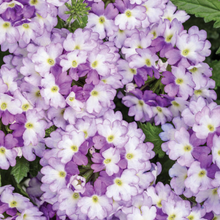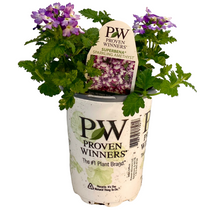DETAILS
Overview
I UPSTAGE other gardens in a SINGLE BOUND.
Bicolor white and amethyst flowers.
Superbena® Sparkling Amethyst bears large clusters of amethyst purple flowers kissed with rosy purple centers. The flowers completely cover the canopy of dark green, powdery mildew-resistant foliage all summer without deadheading. It is an excellent spiller in combination planters and hanging baskets.
Superbena verbenas are very vigorous with strongly trailing habits They need relatively long days to bloom and are difficult to produce in small container sizes. They have very large flowers and umbels. They are great in landscapes and containers. In landscapes, they are best used at the front of beds and they function as spillers in combination planters. If you are looking for a colorful annual ground cover, Superbena is a great choice.
They flower all season.
Superbena have an early compact habit that becomes a vigorous spreader with strong garden performance. The abundance flowering helps these varieties really stand out in the garden.
Sun Exposure

Plants that require part sun to part shade need at least 4 hours of sun but can’t take more than 6 hours of sun. These are great for locations that only get the morning sun or only get the afternoon sun or only get the evening sun. They can also be planted in area that filters the sun all day long like under a tree.
Growing Season



Dimensions
Height: 6-12”
Width: 18-30”
Spacing: 10-14”
Qualities
- Long Blooming
- Heat Tolerant
- Deadheading Not Necessary
- Thriller
- Upright
- Resists Deer
- Drought Tolerant
- Attracts Butterflies
- Attracts Hummingbirds
Maintenance Notes
Self-cleaning, no deadheading necessary.
Superbena are our most vigorous, heat tolerant, and mildew tolerant series. While always great in containers they are also fantastic in landscape beds. They can tolerate dry soils and lower fertility. Normally either an application of slow release fertilizer or amending with compost is enough to keep them happy and blooming in landscape beds. They shouldn't need to be trimmed back but can be given a "haircut" - a trim back - using a sharp pair of scissors or pruning shears at any time. While naturally well branched, trimming them back will encourage additional branching, fuller plants, and ultimately more flowers. I usually give them a very slight trim as I am transplanting to boost branching.
An application of fertilizer or compost on garden beds and regular fertilization of plants in pots will help ensure the best possible performance.




